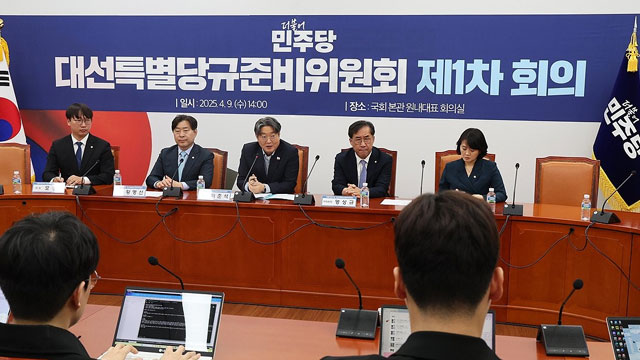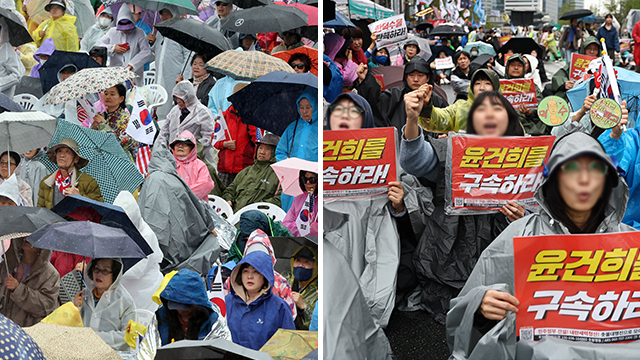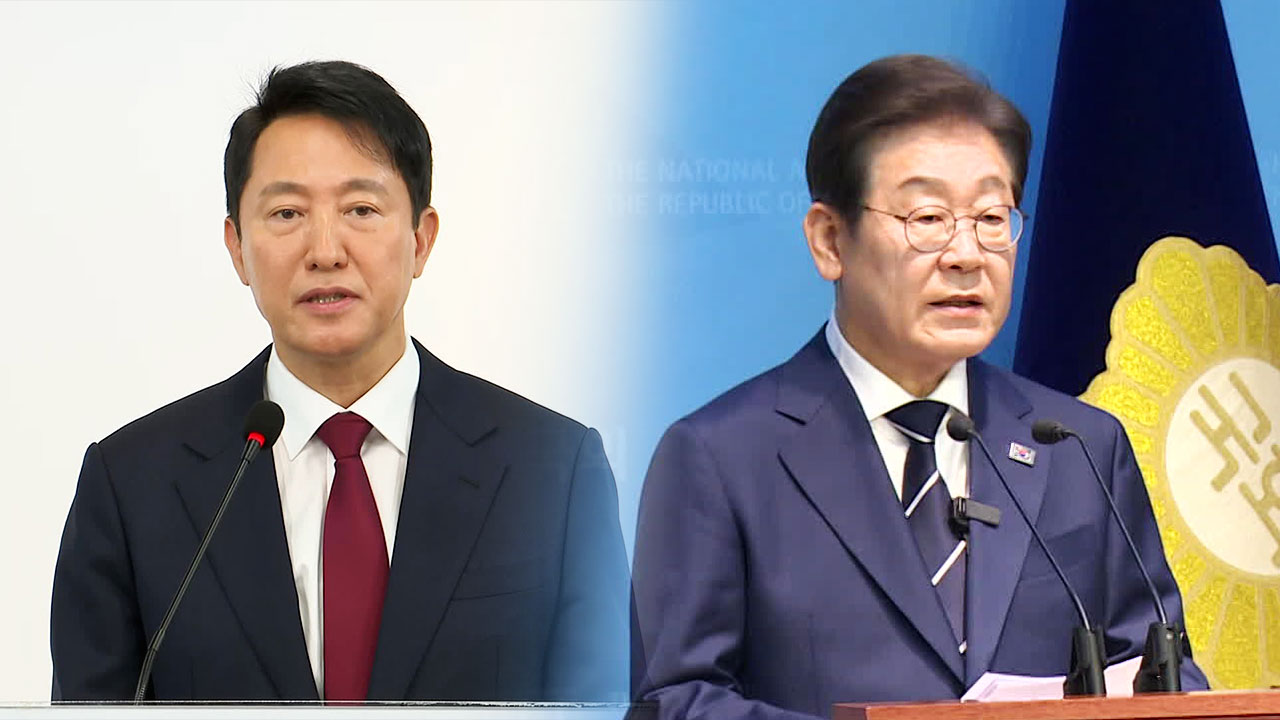[Anchor]
We will examine the Constitutional Court's judgment on the issues of this impeachment trial.
First, it was determined that the declaration of emergency martial law violated both substantive and procedural requirements.
The first proclamation was also deemed unconstitutional.
Reporter Kang Pu-reun reports.
[Report]
Former President Yoon Suk Yeol declared emergency martial law, stating that South Korea was in a 'national emergency situation.'
During the impeachment trial, he repeatedly claimed that a serious crisis arose due to the opposition party's impeachment efforts, budget cuts, and allegations of election fraud.
However, the Constitutional Court stated, "It cannot be said that a serious crisis situation occurred at the time of the martial law declaration."
[Moon Hyung-bae/Acting Chief Justice of the Constitutional Court: "The paralysis of government due to the exercise of the National Assembly's authority or allegations of election fraud should be resolved through political, institutional, and judicial means, not by mobilizing military forces."]
The claim of a so-called 'warning martial law' by former President Yoon's side was also not accepted.
[Moon Hyung-bae/Acting Chief Justice of the Constitutional Court: "Since it did not stop at the declaration of martial law but proceeded to actions that violated the Constitution and laws by mobilizing military and police forces, we cannot accept the respondent's claim of a warning or appealing martial law."]
It emphasized that the procedural requirements set by law were also not followed in the process of declaring emergency martial law.
It pointed out that the specific contents of the martial law were not explained, that no opportunity for opinion statements was given to cabinet members, and that the Prime Minister and committee members did not sign the martial law declaration.
The Constitutional Court judged that the 'proclamation' prohibiting National Assembly and political party activities violated the Constitution, which stipulates the National Assembly's right to demand the lifting of martial law and the party system.
This is KBS News, Kang Pu-reun.
We will examine the Constitutional Court's judgment on the issues of this impeachment trial.
First, it was determined that the declaration of emergency martial law violated both substantive and procedural requirements.
The first proclamation was also deemed unconstitutional.
Reporter Kang Pu-reun reports.
[Report]
Former President Yoon Suk Yeol declared emergency martial law, stating that South Korea was in a 'national emergency situation.'
During the impeachment trial, he repeatedly claimed that a serious crisis arose due to the opposition party's impeachment efforts, budget cuts, and allegations of election fraud.
However, the Constitutional Court stated, "It cannot be said that a serious crisis situation occurred at the time of the martial law declaration."
[Moon Hyung-bae/Acting Chief Justice of the Constitutional Court: "The paralysis of government due to the exercise of the National Assembly's authority or allegations of election fraud should be resolved through political, institutional, and judicial means, not by mobilizing military forces."]
The claim of a so-called 'warning martial law' by former President Yoon's side was also not accepted.
[Moon Hyung-bae/Acting Chief Justice of the Constitutional Court: "Since it did not stop at the declaration of martial law but proceeded to actions that violated the Constitution and laws by mobilizing military and police forces, we cannot accept the respondent's claim of a warning or appealing martial law."]
It emphasized that the procedural requirements set by law were also not followed in the process of declaring emergency martial law.
It pointed out that the specific contents of the martial law were not explained, that no opportunity for opinion statements was given to cabinet members, and that the Prime Minister and committee members did not sign the martial law declaration.
The Constitutional Court judged that the 'proclamation' prohibiting National Assembly and political party activities violated the Constitution, which stipulates the National Assembly's right to demand the lifting of martial law and the party system.
This is KBS News, Kang Pu-reun.
■ 제보하기
▷ 카카오톡 : 'KBS제보' 검색, 채널 추가
▷ 전화 : 02-781-1234, 4444
▷ 이메일 : kbs1234@kbs.co.kr
▷ 유튜브, 네이버, 카카오에서도 KBS뉴스를 구독해주세요!
- No grounds for martial law
-
- 입력 2025-04-05 00:26:11

[Anchor]
We will examine the Constitutional Court's judgment on the issues of this impeachment trial.
First, it was determined that the declaration of emergency martial law violated both substantive and procedural requirements.
The first proclamation was also deemed unconstitutional.
Reporter Kang Pu-reun reports.
[Report]
Former President Yoon Suk Yeol declared emergency martial law, stating that South Korea was in a 'national emergency situation.'
During the impeachment trial, he repeatedly claimed that a serious crisis arose due to the opposition party's impeachment efforts, budget cuts, and allegations of election fraud.
However, the Constitutional Court stated, "It cannot be said that a serious crisis situation occurred at the time of the martial law declaration."
[Moon Hyung-bae/Acting Chief Justice of the Constitutional Court: "The paralysis of government due to the exercise of the National Assembly's authority or allegations of election fraud should be resolved through political, institutional, and judicial means, not by mobilizing military forces."]
The claim of a so-called 'warning martial law' by former President Yoon's side was also not accepted.
[Moon Hyung-bae/Acting Chief Justice of the Constitutional Court: "Since it did not stop at the declaration of martial law but proceeded to actions that violated the Constitution and laws by mobilizing military and police forces, we cannot accept the respondent's claim of a warning or appealing martial law."]
It emphasized that the procedural requirements set by law were also not followed in the process of declaring emergency martial law.
It pointed out that the specific contents of the martial law were not explained, that no opportunity for opinion statements was given to cabinet members, and that the Prime Minister and committee members did not sign the martial law declaration.
The Constitutional Court judged that the 'proclamation' prohibiting National Assembly and political party activities violated the Constitution, which stipulates the National Assembly's right to demand the lifting of martial law and the party system.
This is KBS News, Kang Pu-reun.
We will examine the Constitutional Court's judgment on the issues of this impeachment trial.
First, it was determined that the declaration of emergency martial law violated both substantive and procedural requirements.
The first proclamation was also deemed unconstitutional.
Reporter Kang Pu-reun reports.
[Report]
Former President Yoon Suk Yeol declared emergency martial law, stating that South Korea was in a 'national emergency situation.'
During the impeachment trial, he repeatedly claimed that a serious crisis arose due to the opposition party's impeachment efforts, budget cuts, and allegations of election fraud.
However, the Constitutional Court stated, "It cannot be said that a serious crisis situation occurred at the time of the martial law declaration."
[Moon Hyung-bae/Acting Chief Justice of the Constitutional Court: "The paralysis of government due to the exercise of the National Assembly's authority or allegations of election fraud should be resolved through political, institutional, and judicial means, not by mobilizing military forces."]
The claim of a so-called 'warning martial law' by former President Yoon's side was also not accepted.
[Moon Hyung-bae/Acting Chief Justice of the Constitutional Court: "Since it did not stop at the declaration of martial law but proceeded to actions that violated the Constitution and laws by mobilizing military and police forces, we cannot accept the respondent's claim of a warning or appealing martial law."]
It emphasized that the procedural requirements set by law were also not followed in the process of declaring emergency martial law.
It pointed out that the specific contents of the martial law were not explained, that no opportunity for opinion statements was given to cabinet members, and that the Prime Minister and committee members did not sign the martial law declaration.
The Constitutional Court judged that the 'proclamation' prohibiting National Assembly and political party activities violated the Constitution, which stipulates the National Assembly's right to demand the lifting of martial law and the party system.
This is KBS News, Kang Pu-reun.
이 기사가 좋으셨다면
-
좋아요
0
-
응원해요
0
-
후속 원해요
0
















이 기사에 대한 의견을 남겨주세요.